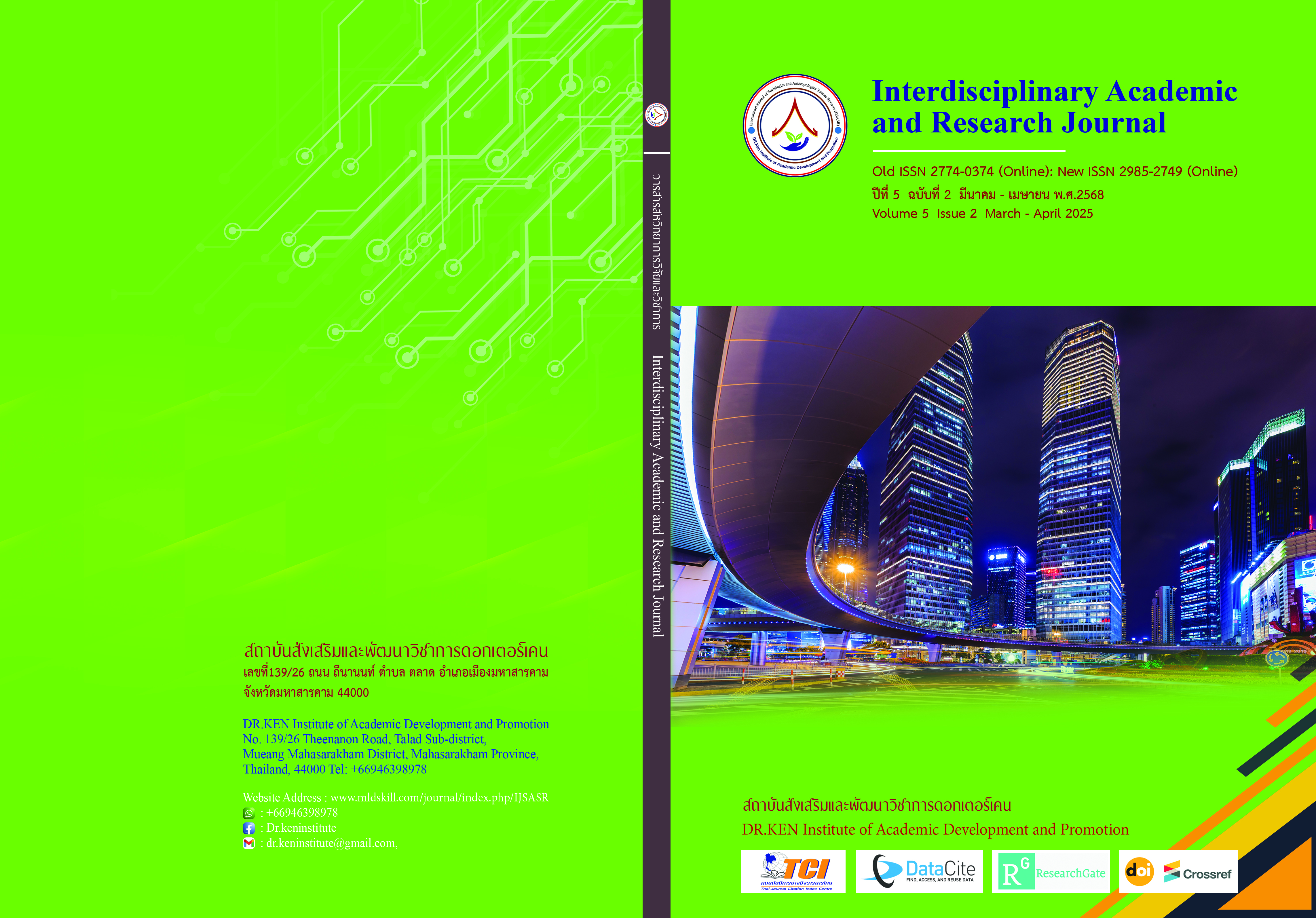Results of the Program to Promote Health Literacy in Preventing Kidney Deterioration of Elderly People with High Blood Pressure, Mueang Suea Subdistrict Phayakkhaphumphisai District, Mahasarakham Province
DOI:
https://doi.org/10.60027/iarj.2025.281779Keywords:
Health Literacy, Health Literacy Promotion Program, Kidney Deterioration PreventionAbstract
Background and Aims: Promoting health literacy among elderly people with high blood pressure is critical for preventing kidney deterioration because it provides them with the knowledge they need to make informed health decisions and practice preventive behaviors. This can improve disease management and reduce the risk of kidney-related complications. Thus, the objective is to study the results of the health literacy promotion program in preventing kidney deterioration in elderly people with high blood pressure.
Methodology: Quasi-experimental research, Pretest-posttest two-group design conducted between October 2023 and July 2024. The sample group was elderly people with high blood pressure in Mueang Suea Subdistrict. Phayakkhaphumphisai District, Mahasarakham Province. Simple randomization was done by drawing lots. Divided into an experimental group of 32 people and a comparison group of 32 people. The experimental group received a health literacy promotion program to prevent kidney deterioration for 12 weeks, while the comparison group received usual care. Data were collected using a health literacy assessment in 6 areas: skills, knowledge, and understanding. Skills for accessing health information and health services, communication skills, Decision-making skills, self-management skills, Media literacy skills, and health behavior assessment. Cronbach's alpha coefficient analysis was over 0.70 in all aspects. Data were analyzed using descriptive statistics and inferential statistics. In the case of normal distribution, use the Independent t-test.
Results: The results of the research found that after joining the program, the experimental group had a higher mean score on health literacy and kidney deterioration prevention behaviors than before joining the program and was significantly higher than the comparison group at the .05 level, thus showing that the results of the program affect the level of health literacy and health behavior in preventing kidney deterioration in elderly people with high blood pressure in a better way Therefore, the results of this operation should be expanded to other groups of chronically ill patients as well.
Conclusion: The study found that the program significantly improved health literacy and kidney deterioration prevention behaviors in elderly patients with high blood pressure when compared to before the program and a control group. This suggests that the program is effective and should be expanded to include other groups of chronically ill patients for broader health benefits.
References
กองสุขศึกษา กรมสนับสนุนบริการสุขภาพ กระทรวงสาธารณสุข. (2563). แนวทางการพัฒนาชุมชนรอบรู้ด้านสุขภาพ. กรุงเทพฯ: บริษัท 25 มีเดีย จำกัด
กานต์ฌิพิชญ์ ปัญญธนชัยกุล. (2560). ประสิทธิผลของโปรแกรมพัฒนาความรอบรู้ด้านสุขภาพในผู้ป่วยโรคความดันโลหิตสูงที่เสี่ยงต่อโรคไตเรื้อรัง. วิทยานิพนธ์ปริญญาพยาบาลศาสตร์มหาบัณฑิต: มหาวิทยาลัยสุโขทัยธรรมาธิราช.
ทองทิพย์ หงษ์สามสิบเจ็ด, สายฝน อินศรีชื่น, วิยะดา เผือกหลวง, โชคชัย พนมขวัญ และรัตน์ชรีญาภรณ์ ฤทธิศาสตร์. (2565). ผลโปรแกรมการส่งเสริมความรอบรู้ด้านสุขภาพต่อพฤติกรรมสุขภาพการป้องกันไตเสื่อมของผู้สูงอายุกลุ่มเสี่ยงโรคไต.วารสารบัณฑิตศึกษามหาจุฬาขอนแก่น, 9(3), 220-230.
ประไพพิศ สิงหเสม, พอเพ็ญ ไกรนรา และวรารัตน์ ทิพย์รัตน์. (2562). การวิจัยเชิงปฏิบัติการสร้างเสริมความรอบรู้ด้านสุขภาพ ผู้สูงอายุตำบลหนองตรุด อำเภอเมืองตรัง จังหวัดตรัง. วารสารวิชาการสาธารณสุข, 29(5), 790-802.
มณีรัตน์ จิรัปปภา. (2557). การชะลอไตเสื่อมจากวัยผู้ใหญ่ถึงวัยผู้สูงอายุ. วารสารวิทยาลัยพยาบาลบรมราชชนนี นครราชสีมา, 20(2), 5–16.
มูลนิธิสถาบันวิจัยและพัฒนาผู้สูงอายุไทย. (2560). สถานการณ์ผู้สูงอายุไทย ประจำปี 2560. นนทบุรี. เอพลัสมีเดีย.
รุ่งนภา อาระหัง. (2560). ผลของโปรแกรมส่งเสริมความรอบรู้ด้านสุขภาพต่อพฤติกรรมการป้องกันโรคความดันโลหิตสูงสำหรับกลุ่มเสี่ยงโรคความดันโลหิตสูงที่ชุมชนแห่งหนึ่งในจังหวัดนครปฐม. วิทยานิพนธ์ปริญญาพยาบาลศาสตรมหาบัณฑิต: มหาวิทยาลัยคริสเตียน.
วัชราพร เชยสุวรรณ. (2560). ความรอบรู้ด้านสุขภาพ : แนวคิดและการประยุกต์สู่การปฏิบัติการพยาบาล.วารสารแพทย์นาวี, 44(3), 183-97.
วิมล โรมา, ชะนวน ทองธนสุกาญจน์, มธุรส ทิพยมงคล, กุลณัฐ นารีเอมยงค์, นรีมาลย์ นีละไพจิตร, สายชล คล้อยเอี่ยม, และมุกดา สำนวนกลาง. (2018). การสำรวจความรอบรู้ด้านสุขภาพของประชาชนไทย อายุ 15 ปี ขึ้นไป พ. ศ. 2560 (ระยะ ที่ 1). สถาบันวิจัยระบบสาธารณสุข.
สุภาวดี อริพันธ์, บังอร เสาหงส์ , ระดาพร วิริยะกุล และอนุเชษฐ์ ทานะขันธ์. (2563). ผลของโปรแกรมการพัฒนาความรอบรู้ด้านสุขภาพต่อพฤติกรรมการจัดการตนเองของผู้ป่วยโรคไตเรื้อรัง โรงพยาบาลส่งเสริมสุขภาพตำบลดงมะยาง อำเภอลืออำนาจ จังหวัดอำนาจเจริญ. http://www.amno.moph.go.th/amno_new/files/2p11.pdf
อรุณ จิรวัฒน์กุล. (2550). ชีวสถิติ (พิมพ์ครั้งที่ 4). ภาควิชาชีวสถิติและประชากรศาสตร์ คณะสาธารณสุขศาสตร์ มหาวิทยาลัยขอนแก่น.
Ali, B., & Gray-Vickrey, P. (2011). Limiting the damage from acute kidney injury. Nursing, 41(3), 22-32. https://doi.org/10.1097/01.NURSE.0000394078.60229.0a
Berkman, N. D., Sheridan, S. L., Donahue, K. E., Halpern, D. J., & Crotty, K. (2011). Low health literacy and health outcomes: An updated systematic review. Annals of Internal Medicine, 155(2), 97-107. https://doi.org/10.7326/0003-4819-155-2-201107190-00005
Cavanaugh, K. L. (2011). Health literacy in diabetes care: Explanation, evidence, and strategies. Journal of Diabetes Science and Technology, 5(3), 440-445. https://doi.org/10.1177/193229681100500304
Edwards, M., Wood, M., Davies, M., & Edwards, A. (2012). The development of health literacy in a patient with a long-term health condition: the health literacy pathway model. Retrieved May 25, 2016 from http://www.biomedcentral.com
Kaeodumkoeng, K. & Tripetchsriurai, N. (2011). Health literacy. Health education division ministry of public health.
Lin, M. Y., Chiu, Y. W., Lee, C. H., Yu, H. Y., Chen, H. C., Wu, M. T., & Hwang, S. J. (2013). Factors associated with CKD in the elderly and nonelderly population. Clinical Journal of the American Society of Nephrology, 8(1), 33-40. https:doi.org/10.2215/CJN.05600612CJN.05600612
Mackey, L. M., Doody, C., Werner, E. L., & Fullen, B. (2016). Self-management skills in chronic disease management: What role does health literacy have? Medical Decision Making, 36(6), 741-759. https://doi.org/10.1177/0272989X16638330
Nutbeam, D. (2008). The evolving concept of health literacy. Social Science & Medicine, 67(12), 2072-2078. https://doi.org/10.1016/j.socscimed.2008.09.050
Downloads
Published
How to Cite
Issue
Section
License
Copyright (c) 2025 Interdisciplinary Academic and Research Journal

This work is licensed under a Creative Commons Attribution-NonCommercial-NoDerivatives 4.0 International License.
Copyright on any article in the Interdisciplinary Academic and Research Journal is retained by the author(s) under the under the Creative Commons Attribution-NonCommercial-NoDerivatives 4.0 International License. Permission to use text, content, images, etc. of publication. Any user to read, download, copy, distribute, print, search, or link to the full texts of articles, crawl them for indexing, pass them as data to software, or use them for any other lawful purpose. But do not use it for commercial use or with the intent to benefit any business.
















.png)


